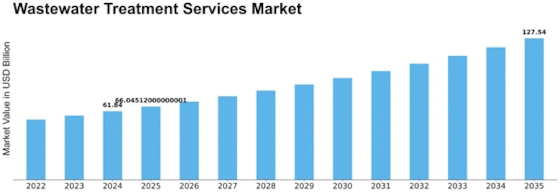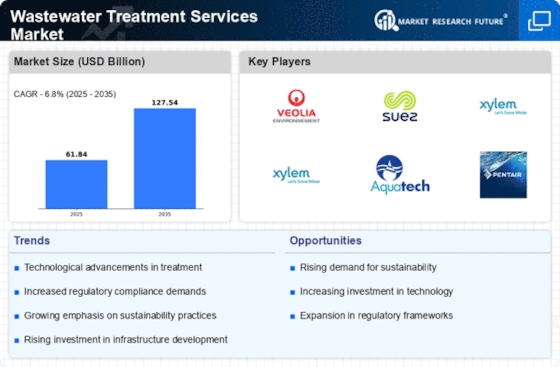Wastewater Treatment Services Size
Wastewater Treatment Services Market Growth Projections and Opportunities
The wastewater treatment services market is influenced by several key market factors that shape its dynamics and growth trajectory. These factors play a crucial role in determining the demand for wastewater treatment services, the competitive landscape, and the overall market outlook.
Firstly, government regulations and environmental policies have a significant impact on the wastewater treatment services market. Stringent regulations regarding wastewater discharge and pollution control drive the demand for advanced treatment solutions. Governments worldwide are increasingly focusing on enforcing stricter environmental standards, which compel industries and municipalities to invest in efficient wastewater treatment technologies and services to comply with regulations.
Secondly, population growth and urbanization are important market factors driving the demand for wastewater treatment services. Rapid urbanization and industrialization lead to increased wastewater generation from residential, commercial, and industrial sectors. As urban populations expand, the need for reliable wastewater treatment infrastructure becomes imperative to prevent environmental contamination and public health hazards. This trend fuels the demand for wastewater treatment services, including consulting, design, construction, operation, and maintenance of treatment facilities.
Moreover, technological advancements and innovations play a crucial role in shaping the wastewater treatment services market. Ongoing research and development efforts aim to improve treatment efficiency, reduce energy consumption, and enhance the overall sustainability of wastewater treatment processes. Innovations such as membrane bioreactors, advanced oxidation processes, and decentralized treatment systems offer more effective solutions for treating diverse wastewater streams. Market players that invest in R&D to develop cutting-edge technologies gain a competitive edge by offering superior solutions to their clients.
Furthermore, economic factors such as investment trends, funding availability, and cost considerations significantly influence the wastewater treatment services market. Economic downturns may impact capital expenditure budgets, leading to delays or cancellations of wastewater treatment projects. Conversely, periods of economic growth and infrastructure development initiatives often stimulate investment in water and wastewater infrastructure projects, driving market growth. Additionally, the cost-effectiveness of wastewater treatment solutions and the availability of financing options influence purchasing decisions by industrial and municipal clients.
Market dynamics are also influenced by factors such as water scarcity, climate change, and public awareness of environmental issues. Growing concerns about water scarcity and the effects of climate change underscore the importance of sustainable water management practices, including wastewater reuse and resource recovery. Public awareness campaigns and advocacy for environmental conservation drive demand for eco-friendly wastewater treatment solutions that minimize environmental impact and promote water conservation.
Moreover, market consolidation and competitive landscape dynamics are important factors to consider in the wastewater treatment services market. Mergers, acquisitions, and strategic partnerships among key players reshape the competitive landscape, driving market consolidation and intensifying competition. Large multinational corporations, as well as smaller niche players, compete for market share by offering specialized expertise, innovative solutions, and value-added services.



















Leave a Comment